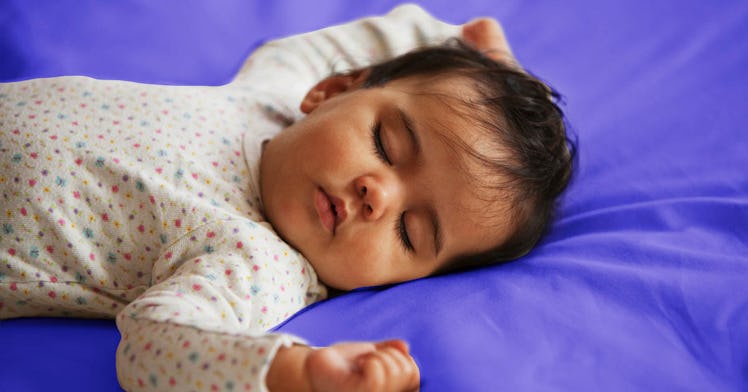Baby Won’t Sleep? Two Tips from New Baby Sleep Research
Ditch the screen and incorporate massage into the bedtime routine

Babies who are awake keep their parents awake, and that can make both parent and baby crabby during the day. But beyond the sleep deprivation doom cycle, quality baby sleep is crucial for early growth and development because as much as 75 percent of a baby’s growth hormone is produced during sleep. And that’s what makes it a perfect topic for ongoing research which is offering new insights into how parents can get babies to sleep and keep them sleeping longer.
New Insight on Screens and Sleep Duration
Research published in the June 2021 issue of The BMJ has strengthened understanding of the influence screen time has on irregular sleep patterns and shorter sleep duration. To reach their conclusion, researchers from Dartmouth College’s Geisel School of Medicine Department of Biomedical Data Science studied the mother-reported screen use and sleep habits of 550 babies from a racially and socioeconomically diverse sample — 67 percent of the infants were Black, and 54.5 percent came from households making less than $20,0000 per year.
After looking at the data researchers found that when comparing babies exposed to screen time to babies not exposed to screen time before 12 months, more screen was associated with less night-time sleep. This was particularly true for babies who were exposed to television and DVD use.
“For example, an infant who averaged 1 hour of television+DVD viewing over the study period slept, on average, 9.20 hours per night by 12 months compared with 9.60 hours per night for an infant with no screen time over the study period,” study authors write.
That may not seem like a huge amount of time, but it does have the potential of disrupting sleep patterns and causing problems.
Those result build on a systematic review and meta-analysis of 31 sleep studies published in the February 2020 issue of Sleep Medicine Reviews. In that study, UK researchers found that “Screen time is unfavorably associated with multiple sleep outcomes in infants, toddlers, and preschoolers. Conversely, in toddlers and preschoolers, more time spent in outdoor play, and in higher intensity physical activity, was associated with better sleep outcomes.”
Pediatrician Dr. Sara Huberman Carbone explains that using screens before bed can negatively affect sleep because they emit blue and white light similar to the sun. “This light can shift our circadian rhythms in the wrong direction, causing a delay in the release of melatonin, our sleep hormone,” she says. “Essentially, light from screens can trick our bodies into thinking it is daytime and delays sleep. Watching shows or playing games can also be stimulating for toddlers, making it hard for a toddler to calm down and get undisrupted sleep.”
If parents are for something to add to their baby’s or infant’s bedtime routine, Carone suggests reading books instead. “Reading with your child also has the added benefit of boosting literacy and language, and is a nice way to connect with your toddler,” she says. “Routine is also key for healthy sleep. Having a consistent bedtime with a simple bedtime routine such as bath, brush teeth, book, and bed, can set the stage for a great night’s sleep.”
Baby Massage to Increase Sleep Quantity and Quality
Several new studies have found that infant massage can be a helpful addition to a screen-free bedtime routine. An example of new baby massage insights can be found in the 2021 study on The Effects of Baby Massage to Sleep Quality in Infants Age 1-7 Months. Studying 25 infants, 80 percent of whom had reportedly poor sleep, researchers in Indonesia found six out of seven babies showed improvement in sleep quality after introducing massage.
Those results are similar to a Malaysian study on the effect of massage on baby sleep for infants 3 to 6-months-old. In the study, published in the Malaysian Journal of Medical Research, scientist found that in a small sample population baby sleep increased a full hour after pre-bedtime massage.
The big caveat in these studies is that the sample sizes are very small. Still, it’s possible that in addition to generally helping your baby relax, other benefits of massage are collectively conducive to quality rest.
The Indonesian researchers point out that infant massage “stimulates the activity of the Vagus Nerve for improved respiration, strengthens the immune system, teaches babies early on about body parts, and increases the flow of oxygen and nutrients to cells.”
Dr. Carone emphasizes the comforting aspects of massage that contribute to quality rest. “Massage is a nice way for parents to bond with their child through skin-to-skin contact with their infant,” she says. “It can also reduce crying in infants and help relieve discomfort from gas.”
How to Massage Your Baby
- Start by creating a warm and calm environment.
- Find the right pressure for your child.
- Use gentle slow strokes on your child’s back, legs and arms.
- Avoid tickling.
- Gauge your child’s response. If they are squirming or seem uncomfortable, hold off on massage and try at a different time.
It may take babies some time to get used to massage, so consider getting them acclimated during the day before trying to make it part of the bedtime routine. Getting them fired up instead of calmed down will make bedtime painful for everyone involved.
While these new sleep insight help parents consider new techniques to fight sleep deficit, it’s important to remember that some babies just aren’t good sleepers. Also, almost all kids go through a phase where they don’t sleep well. But finding strategies that provide at least some incremental improvement in sleep duration and quality are welcome steps on the road to rested.